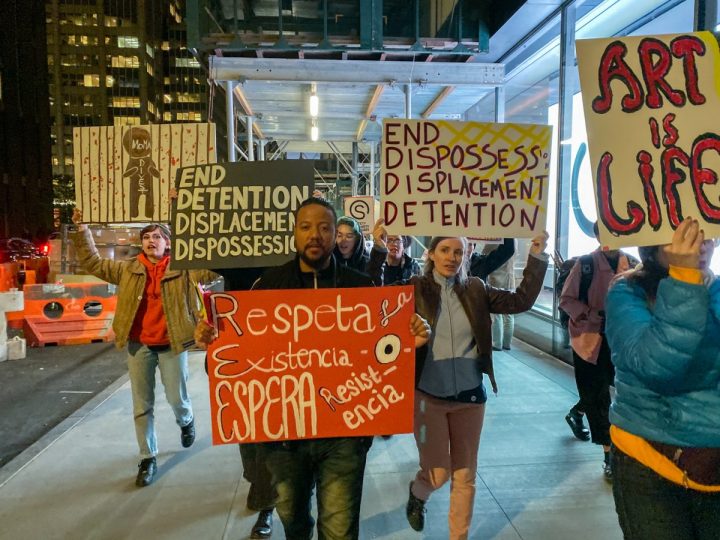
A wide coalition of artist and activist groups is planning a 10-week-long series of protests, actions, and community-led conversations targeting the leadership of the Museum of Modern Art (MoMA) in New York. Proceeding previous protests against MoMA trustees with alleged ties to unethical businesses, the group calls to “dismantle” the museum in its current form, end its dependency on billionaire donors, and reimagine its role in society.
In a statement today, March 23, a new coalition named the International Imagination of Anti-National Anti-Imperialist Feelings (IIAAFF) announced a 10-week “strike” against MoMA starting April 9.
The “Strike MoMA” campaign is comprised of members of 12 activist-artist groups and grassroots organizations, among them MoMA Divest, Forensic Architecture, Decolonize This Place, Comité Boricua En La Diáspora, Take Back the Bronx, and Curators and Educators for Decolonization. The group also includes former MoMA employees.
In a manifesto-style document that lays out the case against MoMA and explains the philosophy behind the initiative, IIAAFF says:
When we strike MoMA, we strike its blood-soaked modernity. The monument on 53rd Street becomes our prism. We see our histories and struggles refracted through its crystalline structure, and foreclosed futures come into view.
Why strike MoMA? So that something else can emerge, something under the control of workers, communities, and artists rather than billionaires.
In recent weeks, MoMA has faced mounting pressure to separate itself from its chairman, Leon Black, for his former ties with convicted sex offender Jeffrey Epstein. Facing backlash from the business world and the general public, Black announced in January of this year that he will step down as CEO of his private equity firm Apollo Global Management in July, but planned to remain as chairman. In an abrupt change of plans, Black announced yesterday that he is stepping down, effective immediately. He will also relinquish his chairman position, citing health reasons. Neither the museum nor Black has given any indication that they might part ways.
“Whether Black stays or goes, a consensus has emerged: beyond any one board member, MoMA itself is the problem,” IIAAFF’s statement says. It continues to list several other MoMA trustees — Larry Fink, Glenn Dubin, Steven Tananbaum, Steven Cohen, Ronald Lauder, and others — who have controversial political and financial histories, including alleged ties to Epstein and Donald Trump, and stakes in businesses involved in vulture capitalism, environmental destruction, and mass incarceration.
The activists also charge MoMA with “elitism, hierarchy, inequality, precarity, disposability, anti-Blackness, [and] misogyny.” They cite as a recent example the museum’s decision to terminate all museum educator contracts in the early months of the COVID-19 pandemic “while the high-ups have carried on in luxury.”
“We refuse to acknowledge the separation of the museum from the rest of society,” the group says. “We see MoMA as existing on the same plane as the violence of the ruling class that has controlled it.”
The planned “Ten Weeks of Art, Action, and Conversation” will include training sessions, writing projects, agitprop campaigns, and direct actions at the museum and other locations. They will also organize a series of virtual and in-person conversations focusing on “collective research, archival investigation, and speculative visioning concerned with post-MoMa futures.” A number of orientations, including one limited to BIPOC, will be held in advance of the planned strike.
At the end of the 10 weeks, the activists will reconvene to discuss a “just transition to a post-MoMA future that prioritizes workers and communities.”
According to the statement, the meeting “will determine the next steps for disassembling the museum in light of its harmful history: determining the mechanics of divestment and transfer of assets, the redistribution of properties and the repurposing of infrastructure; establishing funds for reparations, rematriations, and Indigenous land restoration; sustained support for just transition of workers to cooperative self-management and solidarity economies.”
“As MoMA winds down and we extract our imagination from its orbit, our energies, resources and labor power will be freed up for creating alternatives in its place,” the group adds. “Alternatives controlled by workers and communities, not billionaires and their enablers. This could be a first step for a city-wide process.”
MoMA has not yet responded to Hyperallergic’s request for comment.
0 Commentaires